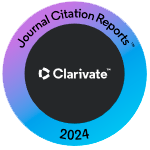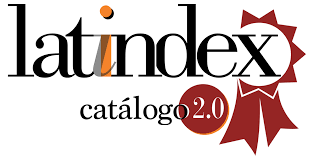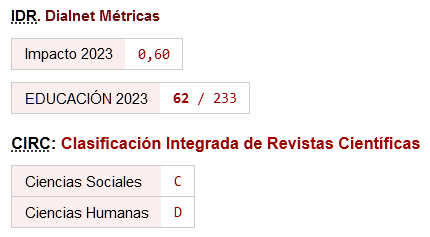Self-efficacy in university students: the role of academic empowerment
DOI:
https://doi.org/10.46661/ijeri.4618Keywords:
Academic self-efficacy, empowerment, academic empowermentAbstract
Academic self-efficacy constitutes an important factor for optimal performance in the university. In the current teaching-learning model, academic empowerment appears as a process that facilitates the acquisition of tools necessary to develop self-efficacy. The empowerment of the student can enhance their actions to improve their skills, adapt and transform their environment.
The objective of the study was to analyze the relationship between academic empowerment and the academic self-efficacy of university students. For this, the data of 440 university students of different years and careers were analyzed, using three Likert-type scales adapted to the academic field. Pearson correlations and structural equations (SEM) were applied to the variables studied. The results have shown that psychological empowerment plays a mediating role between structural empowerment and academic self-efficacy. These results highlight the transcendent role of the structural conditions that must sustain the learning process.
Downloads
References
Bandura, A. (1986). Social foundations of thought and action: A social cognitive theory. Englewood Cliffs, NJ: Prentice-Hall.
Bandura, A. (1987). Pensamiento y acción. Fundamentos sociales. Barcelona: Martínez Roca.
Baron, R. M. y Kenny, D. A. (1986). The moderator-mediator variable distinction in social psychological research: Conceptual, strategic and statistical considerations. Journal of Personality and Social Psychology, 51, 1173-1182. Recuperado de https://www2.psych.ubc.ca/~schaller/528Readings/BaronKenny1986.pdf
Barraza, A. (2010). Validación del inventario de expectativas de autoeficacia académica en tres muestras secuenciales e independientes. CPU-e. Revista de Investigación Educativa, 10. Recuperado de http://www.uv.mx/cpue/num10/inves/barraza _validacion.html
Bentler, P. M. (1990). Comparative fit indexes in structural models. Psychological Bulletin, 107(2), 238–246. doi:10.1037/0033-2909.107.2.238
Blanco Vega, Humberto, Ornelas Contreras, Martha, Aguirre Chávez, Juan Francisco, & Guedea Delgado, Julio César. (2012). Autoeficacia percibida en conductas académicas: diferencias entre hombres y mujeres. Revista mexicana de investigación educativa, 17(53), 557-571. Recuperado de http://www.scielo.org.mx /scielo.php?script=sci_arttext&pid=S1405-66662012000200011&lng=es&tlng=es
Canto y Rodríguez, J. E. (1998). Autoeficacia y educación. Educación y Ciencia, 2(4), 45 – 53. Recuperado de http://educacionyciencia.org/index.php/educacionyciencia /article/download/142/pdf
Cavazos Arroyo, J. y Encinas Orozco, F. C. (2016). Influencia del engagement académico en la lealtad de estudiantes de posgrado: un abordaje a través de un modelo de ecuaciones estructurales. Estudios Gerenciales, 32(140), 228-238. Recuperado de https://dx.doi.org/10.1016/j.estger.2016.07.001
Chen, H. F. and Chen, Y. C. (2008). The Impact of Work Redesign and Psychological Empowerment on Organizational Commitment in a Changing Environment: An Example from Taiwan's State-Owned Enterprises. Public Personnel Management, 37(3), 279 – 302. doi:10.1177/009102600803700302
Dominguez, S., Villegas, G., Yauri, C., Mattos E. & Ramírez F. (2012). Propiedades psicométricas de una escala de autoeficacia para situaciones académicas en estudiantes universitarios peruanos. Revista de Psicología-Universidad Católica San Pablo, 2(1), 27-39. Recuperado de http://35.161.26.73/index.php/psicologia /article/view/8/7
Gutiérrez-García, A. G. y Landeros-Velázquez, M. G. (2017). Evaluación de funciones ejecutivas en estudiantes universitarios con niveles de autoeficacia percibida baja. Revista Electrónica de Psicología Iztacala, 20(2), 397-426. Recuperado de https://www.iztacala.unam.mx/carreras/psicologia/psiclin/vol20num2/Vol20No2Art1.pdf
George, D., & Mallery, M. (2010). SPSS for Windows Step by Step: A Simple Guide and Reference, 17.0 update (10a ed.) Boston: Pearson.
Jáimez Román, M. J. y Bretones, F. D. (2013). Spanish Adaptation of the Structural Empowerment Scale. Spanish Journal of Psychology, 16(15), 1–7. doi:10.1017/sjp.2013.14
Jáimez Román, M.J. (2013). Organizaciones saludables: el papel del empoderamiento organizacional. Granada: Universidad de Granada. Recuperado de http://hdl.handle.net/10481/23761
Jöreskog, K. G., & Sörbon, D. (2019). LISREL 10: user’s reference guide. Chicago: Scientific Software International.
Kline, R. B. (1998). Methodology in the social sciences. Principles and practice of structural equation modeling. Guilford Press.
Laschinger, H. K. S., Finegan, J. E., Shamian, J., & Wilk, P. (2004). A longitudinal analysis of the impact of workplace empowerment on work satisfaction. Journal of Organizational Behavior, 25(4), 527-545. doi: 10.1002/job.256
Magendzo, A. (2003). Pedagogía crítica y educación en derechos humanos. Paulo Freire. Revista de Pedagogía Crítica, 2(2), 19-27. Recuperado de http://bibliotecadigital .academia.cl/bitstream/handle/123456789/1624/019-027.pdf?sequence=1
Pajares (2002). Self-efficacy beliefs in academic contexts: An outline. Recuperado de http://www.uky.edu/~eushe2/Pajares/efftalk.html
Palenzuela, D. L. (1983). Construcción y validación de una escala de autoeficacia percibida específica de situaciones académicas. Análisis y Modificación de Conducta, 9(21), 185-219. Recuperado de https://dialnet.unirioja.es/descarga/articulo/7101317.pdf
Pérez, F. (2018). Autoeficacia general, académica y rendimiento académico en estudiantes universitarios (Doctoral dissertation, Universidad Argentina de la Empresa). Recuperado de https://repositorio.uade.edu.ar/xmlui/bitstream/handle/123456789 /7929/PEREZ%20F.-TIF.pdf?sequence=3&isAllowed=y
Román-Calderón, J. P., Krikorian, A., Ruiz, C. F., & Gaviria, A. B. (2016). Apoyo organizacional y empoderamiento como antecedentes de comportamientos empoderados y participación de los empleados. Estudios Gerenciales, 32(139), 154-161. doi:10.1016/j.estger.2016.03.002
Sánchez, A. (2002). Dispositivos de empoderamiento para el desarrollo psicosocial. Universitas Psychologica, 1(2), 39-48. Recuperado de http://www.redalyc.org /articulo.oa?id=64701206
Schunk, D. H. (1991). Self-efficacy and academic motivation. Educational Psychologist. 26(3), 207-231. doi:10.1080/00461520.1991.9653133
Spreitzer, G. M. (1995). Psychological empowerment in the workplace: Dimensions, measurement, and validation. Academy of Management Journal, 38(5), 1442-1465. doi:10.5465/256865
Steiger, J. H. (1990) Structural Model Evaluation and Modification: An Interval Estimation Approach. Multivariate Behavioral Research, 25(2), 173-180. doi: 10.1207/s15327906mbr2502_4
Tabachnick, B.G. and Fidell, L.S. (2001) Using Multivariate Statistics. 4th Edition, Allyn and Bacon, Boston.
Torres, A. (2009). La educación para el empoderamiento y sus desafíos. Sapiens. Revista Universitaria de Investigación, 10(1), 89-108. Recuperado de https://www.redalyc.org /pdf/410/41012305005.pdf
Ventura de la Roca, D. (2012). Eficacia en estudiantes de último año de psicología clínica en relación a la práctica profesional supervisada. Tese de licenciatura da Universidad Rafael Landívar, Facultad de Humanidades, Guatemala. Recuperado de http://biblio3.url.edu.gt/Tesis/2012/05/42 /De-La-Roca-David.pdf
Wall, L. (2012). An Exploratory Study of Teacher Empowerment and Technical Education in Kentucky. Dissertations, 38, 11-15. Recuperado de http://digitalcommons.wku.edu /diss/38
Xue, Y., Bradley, J. and Liang, H. (2011). Team climate, empowering leadership, and knowledge sharing. Journal of Knowledge Management, 15(2), 299-312. https://doi.org/10.1108/13673271111119709
Zambrano, C. y Quinde, J. (2015). Satisfacción Laboral y Empowerment en Médicos y Enfermeros. Tesis de grado no publicada. Universidad Adventista del Plata, Entre Ríos, Argentina.
Downloads
Published
How to Cite
Issue
Section
License
Copyright (c) 2020 Marisa Cecilia Tumino, Josué Mauricio Quinde, Lilian Noemí Casali, Melissa Raquel Valega

This work is licensed under a Creative Commons Attribution-NonCommercial-NoDerivatives 4.0 International License.











